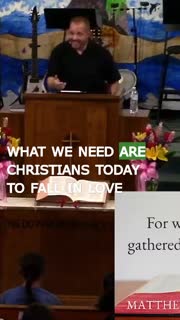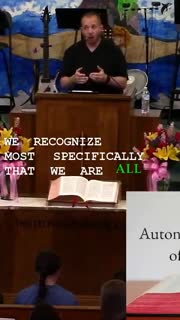Embracing Church Autonomy Under Christ's Lordship
Devotional
Sermon Summary
Bible Study Guide
Sermon Clips
### Quotes for Outreach
1. "The power lies within the body. See the Lord provides spiritual leadership in pastors and we each have authority to govern ourselves when we assemble as the body of Christ. And we believe that this is the biblical model for a New Testament church." [42:26] (16 seconds)
2. "The head of a church is Jesus Christ. Over and over and over again, this is Jesus' church. Where do we get that from? Well, I'll remind you from what I read. Colossians chapter 1. And He being Jesus is the head of the body, the church. Ephesians chapter 5. Christ is the head of the church, His body and is Himself its Savior." [48:37] (27 seconds)
3. "When we gather, even if there's just two or three of us, Jesus is here among us. And you know what that means? It means that Jesus is here with us right now. God's word says that he himself is in this have church in a deer blind. It's why you can't have church out on your fishing boat, whether you're in the bay or on the lake. The assembled church is that important." [01:00:24] (41 seconds)
4. "Maybe we need to thank God today that we don't answer to a bishop or we don't answer to a council of elders. Maybe we need to thank God today that we only answer to Christ who is our head and who has loved us perfectly and redeemed us wholly. We have the God-given spiritual authority to govern ourselves." [01:01:25] (23 seconds)
5. "What we need are Christians today to fall in love again with the very church that Jesus Christ died for. That's what we need. The very church where if there are even two or three gathered, Christ Father in heaven, God, we thank you for your beautiful bride, as imperfect as we are and as often as we fail." [01:01:56] (35 seconds)
### Quotes for Members
1. "We recognize most specifically that we are all equal when we come before the foot of the cross of our Lord and Savior, Jesus Christ. It doesn't matter if you're rich. It does not matter if you're poor. But if you have been born again from the Spirit who is from above, you have 100% of God's Spirit and therein, God can speak through you and therein, you have a voice." [30:26] (23 seconds)
2. "The church is an autonomous body operating through democratic processes under the lordship of Jesus Christ. In such a congregation, members are equally responsible. What it says. And we believe that with the new covenant that's been ushered in with the sacrifice of Jesus Christ that God no longer works through kings nor does he work through nations but God has chosen to work through nations. To work for the salvation of souls in and through the work of the church." [30:55] (33 seconds)
3. "The church has been given responsibility to govern themselves in every aspect of church life. But how do we get here? We get there by what the Bible says very plainly. The Word of God tells us that the head of the church is not a bishop nor is the head of the church a pastor or an elder. No, the head of a church is Jesus Christ." [48:06] (26 seconds)
4. "We know that as we read it and the Spirit who is within us communes with His Word, we know that our hearts are oriented towards the heart of very own Jesus. Jesus who is our head. And as we govern ourselves as a church, I need us to also recognize that though we are an independent body, no other organization tells us how to do church, Jesus is the one who tells us how to do church." [53:06] (29 seconds)
5. "We need to be aware of our heritage and we need to be intimately aware of what the Word of God says so that we might guard it as we practice and live our faith out. If I were to come to you today and ask you where the power in the United States of America is, you'd probably tell me Washington, D.C. You'd probably tell me the power in this country is with the President or with Congress." [57:04] (35 seconds)
Ask a question about this sermon
1. "The power lies within the body. See the Lord provides spiritual leadership in pastors and we each have authority to govern ourselves when we assemble as the body of Christ. And we believe that this is the biblical model for a New Testament church." [42:26] (16 seconds)
2. "The head of a church is Jesus Christ. Over and over and over again, this is Jesus' church. Where do we get that from? Well, I'll remind you from what I read. Colossians chapter 1. And He being Jesus is the head of the body, the church. Ephesians chapter 5. Christ is the head of the church, His body and is Himself its Savior." [48:37] (27 seconds)
3. "When we gather, even if there's just two or three of us, Jesus is here among us. And you know what that means? It means that Jesus is here with us right now. God's word says that he himself is in this have church in a deer blind. It's why you can't have church out on your fishing boat, whether you're in the bay or on the lake. The assembled church is that important." [01:00:24] (41 seconds)
4. "Maybe we need to thank God today that we don't answer to a bishop or we don't answer to a council of elders. Maybe we need to thank God today that we only answer to Christ who is our head and who has loved us perfectly and redeemed us wholly. We have the God-given spiritual authority to govern ourselves." [01:01:25] (23 seconds)
5. "What we need are Christians today to fall in love again with the very church that Jesus Christ died for. That's what we need. The very church where if there are even two or three gathered, Christ Father in heaven, God, we thank you for your beautiful bride, as imperfect as we are and as often as we fail." [01:01:56] (35 seconds)
### Quotes for Members
1. "We recognize most specifically that we are all equal when we come before the foot of the cross of our Lord and Savior, Jesus Christ. It doesn't matter if you're rich. It does not matter if you're poor. But if you have been born again from the Spirit who is from above, you have 100% of God's Spirit and therein, God can speak through you and therein, you have a voice." [30:26] (23 seconds)
2. "The church is an autonomous body operating through democratic processes under the lordship of Jesus Christ. In such a congregation, members are equally responsible. What it says. And we believe that with the new covenant that's been ushered in with the sacrifice of Jesus Christ that God no longer works through kings nor does he work through nations but God has chosen to work through nations. To work for the salvation of souls in and through the work of the church." [30:55] (33 seconds)
3. "The church has been given responsibility to govern themselves in every aspect of church life. But how do we get here? We get there by what the Bible says very plainly. The Word of God tells us that the head of the church is not a bishop nor is the head of the church a pastor or an elder. No, the head of a church is Jesus Christ." [48:06] (26 seconds)
4. "We know that as we read it and the Spirit who is within us communes with His Word, we know that our hearts are oriented towards the heart of very own Jesus. Jesus who is our head. And as we govern ourselves as a church, I need us to also recognize that though we are an independent body, no other organization tells us how to do church, Jesus is the one who tells us how to do church." [53:06] (29 seconds)
5. "We need to be aware of our heritage and we need to be intimately aware of what the Word of God says so that we might guard it as we practice and live our faith out. If I were to come to you today and ask you where the power in the United States of America is, you'd probably tell me Washington, D.C. You'd probably tell me the power in this country is with the President or with Congress." [57:04] (35 seconds)










